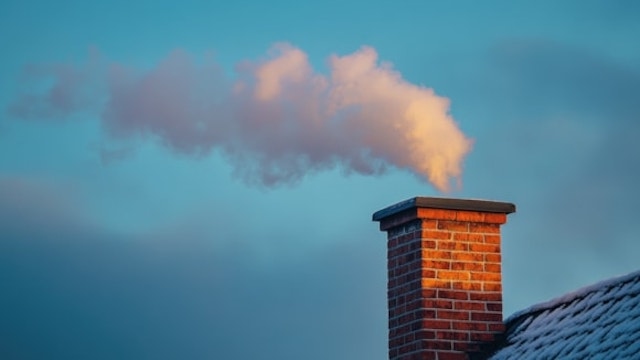Campaign throws spotlight on how to ‘burn better’ at home this winter
Date published: 17 November 2024

Chimney
Greater Manchester residents are being urged to follow advice that can reduce the impact on health and the environment from woodburning stoves and open fires this winter, after new research found that only 1 in 10 people are aware that burning at home is a major cause of pollution that harms health.
Early findings from a University of Manchester study have revealed a “considerable gap” in people’s knowledge around the impacts of burning at home.
Tiny particles in smoke from open fires, wood burners or stoves can damage people’s health, increasing the risk of respiratory conditions, such as asthma, and lead to more serious health conditions.
But only 12% of participants surveyed last winter knew that smoke from open fires, wood burners or stoves is a major contributor to national emissions of fine particulate matter (PM2.5) pollution.
The two-year research project – run in partnership with Greater Manchester’s 10 local authorities with national funding from Defra (Department for Environment, Food and Rural Affairs) – started last winter.
Using insight from the survey, Greater Manchester has now launched a knowledge hub – www.burnbettergm.co.uk – as part of a campaign to educate local communities about the health impacts of burning at home, alongside cheaper and safer ways to ‘burn better’ – and cleaner, greener alternatives.
Lead researcher Dr Emily Matthews, Atmospheric Scientist at The University of Manchester, said: “Many people are surprised to find that domestic burning is a major contributor to harmful fine particulate emissions in the UK, expecting construction or transport to be higher sources. In fact, in the UK, domestic wood burning is the biggest source of small particle air pollution, even exceeding road traffic.
“Our initial findings are helping us gain invaluable insights into what fuels people burn indoors and outdoors in Greater Manchester.
“Ultimately, we hope the study will help us both raise awareness about the harmful impacts burning can have on people and the environment, but also encourage cleaner and safer burning behaviours that can protect us all.”
Survey results show low awareness of the designated Smoke Control Areas (SCA) in place across most of Greater Manchester.
Rules state that you cannot release smoke from a chimney, and that you can only burn authorised fuel, unless using an exempt or approved appliance, with financial penalties for rule breakers. But half of the respondents to the research either did not know what an SCA was or were unsure whether they lived in one.
While the increased cost of heating has fueled interest in alternative ways of keeping warm, the study suggests that indoor fires and wood burners are primarily used for secondary heating.
Councillor Eamonn O’Brien, Leader of Bury Council and Greater Manchester’s Portfolio Lead for Clean Air, said: “It’s great to see some of the early findings from the University of Manchester’s pioneering research project which we hope will make a real difference to health outcomes in our city region. If you need – or choose – to burn at home this winter to stay warm, we want you to know there are ways to burn better.
“Despite the increase we’ve seen in heating costs over the last few years, alternatives like gas central heating and heat pumps are not only better for your health and environment, but can be cheaper.
“I’d urge anyone who burns at home to take a few minutes to find out more about the health impacts, rules and how to burn better, as it could make a big difference to you, your family, and your neighbours’ health. Some small changes can make a real difference.”
Residents who need to burn at home to stay warm this winter are being advised to follow guidelines to reduce the amount of harmful particulate pollution released into their homes:
Choose fuels that are cleaner to burn. Look out for the ‘Ready to Burn’ logo.
- Only burn seasoned, dry wood with a moisture content of less than 20%.
- Get your chimney swept each year and your stove checked regularly.
- Do not burn rubbish or general waste indoors or outdoors.
Do you have a story for us?
Let us know by emailing news@rochdaleonline.co.uk
All contact will be treated in confidence.
Most Viewed News Stories
- 1'Eyesore’ land in the town centre will become home to new apartment block
- 2Contractor appointed for regeneration scheme in Rochdale town centre
- 3Castleton station ‘to become epicentre of huge change and growth’
- 4Rochdale Exchange Market to reopen after a decade
- 5Decision delayed on 445-home estate in Castleton
To contact the Rochdale Online news desk, email news@rochdaleonline.co.uk or visit our news submission page.
To get the latest news on your desktop or mobile, follow Rochdale Online on Twitter and Facebook.

